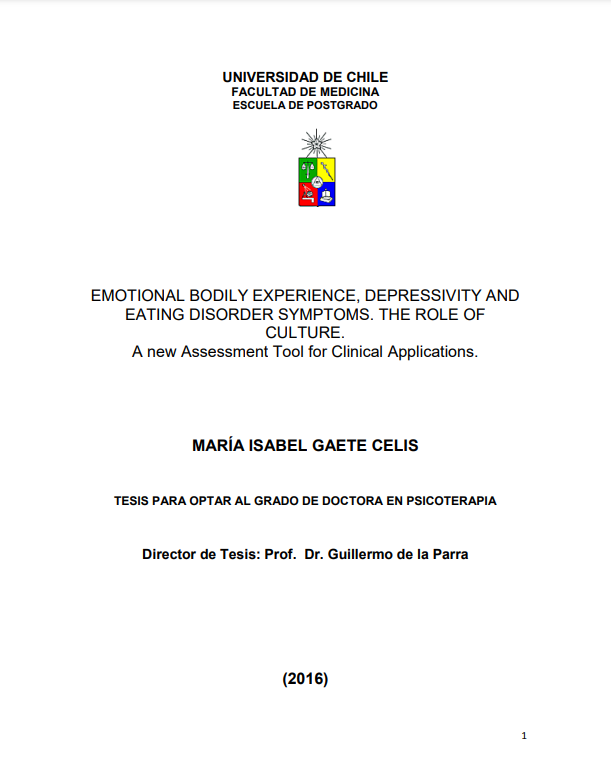Emotional bodil y experience, depressivity and eating disorder symptoms : the role of culture : a new assessment tool for clinical applications
Licencia: Creative Commons (by-nc-nd)
Autor(es): Gaete, María
The present dissertation is aimed at developing a conceptualization and operationalization of emotional bodily experience (EBE) that be clinically useful, and able to distinguish between genders, and adaptive and maladaptive forms of bodily experience in association with depressivity and eating disorder symptoms. It is also aimed at exploring how culture shapes emotional bodily experience of individuals. Thus, a first part corresponds to the development of the notion of emotional bodily experience built upon the phenomenology of the body and the phenomenology of affectivity. Likewise, it was also proposed the hypothesis of the embodied defense for the comprehension of eating disorder psychopathology. Secondly, the development and validation of the Emotional Bodily Experience Questionnaire (EBEQ) was conducted through three different studies: A first study aimed at the operationalization of the EBE construct into a self-report questionnaire, a second study for the validation of the preliminary theoretical structure of the questionnaire, and a third study testing the psychometric properties of the final structure of EBEQ. Finally, a third part of this dissertation was aimed at testing the association of EBEQ with clinical and cultural variables. The methodology used was cross-sectional, comparative and exploratory while this investigation is rising a new variable (EBEQ) which it is expected to be a first step for further research. Two samples were recruited: a Chilean sample of 402 young adults, and a German sample of 50 young adults. Results present a final version of 27 items and 6 scales of EBEQ with good psychometric properties, reliability and validation indexes. Likewise, satisfactory ability for distinguishing between groups was observed. It gives support to the hypotheses about gender differences with higher levels of attention to the body and higher levels of affect intensity of bodily experiences for women compared with men. Likewise, EBEQ showed satisfactory ability to distinguish between a clinical sample (27 females referred to a specialized treatment with a diagnosis of eating disorder (ED)) and a non-clinical sample (183 females from general population sample). ED patients showed usually paying more attention to their bodies, paying more attention to their bodies when feeling negative emotions, and at contexts of public exposure. Non-clinical sample showed an overall significantly higher level of affect intensity of bodily experiences than ED patients.
[Santiago: 2016]
Compartir:
Una vez que el usuario haya visto al menos un documento, este fragmento será visible.


